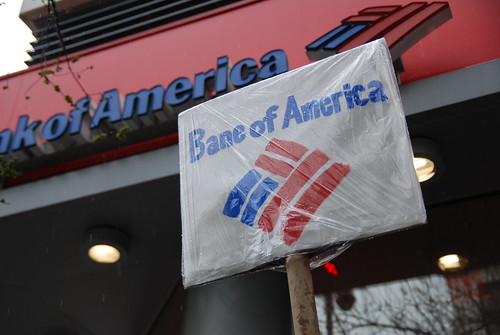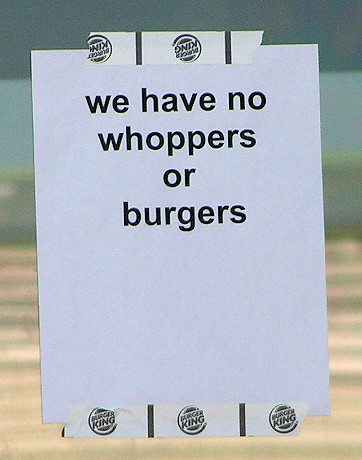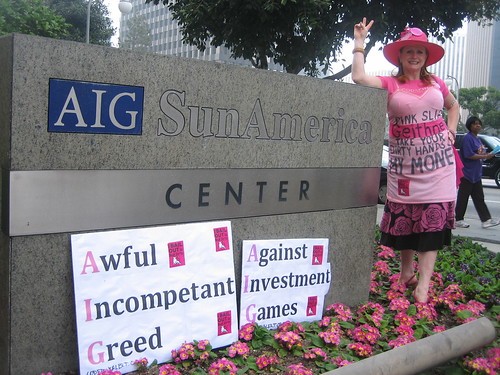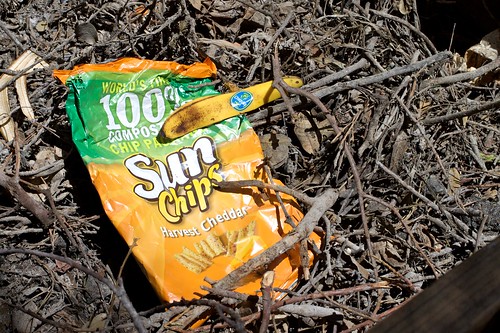Here is a collection of the biggest blunders, bloopers, and dumbest business moves of the past decade:
1. The Bigger They Are, the Harder They Fall
Immersed in obscure accounting practices that concealed loses worth billions of dollars, Enron’s downfall at the end of 2001, will certainly be remembered as one of the most notorious scandals in history. In the end, Enron’s stock plummeted from a high of $90 per share in mid 2000, to just $0.10 a little over a year later causing stock holders to lose some $11 billion. With $63.4 billion in assets, Enron filing was the biggest bankruptcy in U.S. history until it was eclipsed by WorldCom the next year and Lehman Bros in 2008.
2. Like Father, Like Son
At its height, Adelphia Communications was the fifth largest cable provider in the United States. But that came to a pitiful end in June 2002 when founder John Rigas and his son Timothy were convicted for embezzling millions of dollars from the company, hiding $2.3 billion in debt, and deceiving investors about Adelphia’s profit and subscriber growth. Father and son received prison sentences of 15 and 20 years, respectively, and the company’s assets were later snapped up by Comcast and Time Warner in bankruptcy court.
3. 101 Ways to Save… What?!
In 2006, Northwest Airlines circulated a personal finance guide entitled “101 Ways to Save Money” among some of its employees. Though the “guide” contained some odd pieces of advice, such as “Don’t be shy about pulling something you like out of the trash,” the oddest part about it was the timing of its release. Shortly, thereafter, the bankrupt airline, began laying off thousands of airline employees.
4. A little Shut-Eye
During a routine service call for customer Brian Finkelstein in June 2006, a Comcast cable repairman falls asleep on the couch while attempting to call the company for assistance and being put on hold for over an hour. The incident was caught on video with an added soundtrack and Finkelstein’s voice-over lamenting Comcast’s poor equipment, absorbent prices, and terrible customer service. Needless to say, the video became a viral hit.
5. Never mind, I Take it Back…
As an apparent token of appreciation in June 2007, National Semiconductor, a maker of computer chips for the Apple iPod, handed out to every employee a version of the portable music player. Merely a month later, the company laid off 35 workers and demanded that they give back their iPods, claiming that the devices were company equipment.
6. Meet Your Biggest Fan… You!
September 2006 saw the emergence of “Wal-Marting Across America” a blog that chronicled the discoveries of supposed Walmart enthusiasts, Jim and Laura as they traveled across America in a RV visiting Walmarts along the way and chatting with happy Walmart employees. The blog was later exposed by BusinessWeek.com as a fake, a publicity stunt coordinated by Walmart’s PR company Edelman PR and paid for by Walmart.
7. I Get Knocked Down, But I Get Up Again
In June 2006, disgruntled AOL customer Vincent Ferrari calls AOL customer service to cancel his membership and records his experience. Throughout the duration of the 21 minute phone conversation, a “retention consultant” named John persistently tries to persuade Mr. Ferrari from closing the account even though he specifically asks to cancel it 18 times. “You’re going to let me speak,” John says. “If not, we can just argue all day. I really don’t care.” After ending the call, Ferrari posts the recording on his blog and it goes viral eliciting a ton of negative press for the ailing internet company.
8. One Final Request Before You Go…
After Bank of America announces in 2007 that it will outsource 100 tech support jobs from the San Francisco Bay Area to India, the current American workers are informed that they must train their own replacements in order to receive their severance payments.
9. Up in Arms
In September 2009, the Bank of America came under fire when bank personnel in a Tampa, Florida branch refused to cash a check for Steve Valdez, who was born without arms and wears prosthetics because he was unable provide a thumbprint. Mr Valdez was refused even though the check was written to his wife’s account and he presented two forms of photo identification.
10. Underestimating the Power of Oprah
In May 2009, KFC ran a promotion for its new Kentucky Grilled Chicken by having Oprah Winfrey offer a coupon for a free meal both on her show and online. Instantly, more than 10 million people downloaded coupons and headed to their local KFC. Unable to keep up with the demand, the stores had to turn countless people away empty-handed.
11. An Act of God
In November 2009, London Times reporter John Arlidge conducted an exclusive interview with Lloyd Blankfein, CEO of the investment firm everyone loves to hate, Goldman Sachs. Goldman had agreed to the interview in an attempt to restore the investment bank’s tarnished image after a country dogged by high unemployment, home foreclosures, and tighten credit, watched the bailed-out bank ride out the recession unscathed while handing out mind boggling bonuses. Among the list of self-platitudes, the gregarious CEO affirmed that Goldman has a “social purpose” that “everybody should be, frankly, happy [about the bank’s success],” and that he’s “doing God’s work.”
12. You Can’t Have It Your Way
In November 2009, after its franchisees rejected a proposal for a $1 double-cheeseburger promotion, claiming that the promotion would make them to lose about 10 cents on each sale of the sandwich, Burger King Corp chose to run the promotion anyway. The National Franchisee Association, which represents about 80 percent of the stores in the U.S. filed a lawsuit shortly thereafter. A Miami federal judge later dismissed the case, and in April 2010 Burger King stopped requiring franchisees to sell the burger for $1, raising the price to $1.29. But the incident nevertheless left a bad taste in the mouth of those following the story.
13. Thin is In
In October 2009, a magazine ad for clothing designer Ralph Lauren, drew criticism and derision for featuring a model whose image was altered so that her head appears wider than her hips. Soon after other images surfaced. A cease and desist letter sent out by Ralph Lauren in response only fueled the flames, until the company was forced to concede, “After further investigation, we have learned that we are responsible for the poor imaging and retouching that resulted in a very distorted image of a woman’s body.”
14. United Breaks Guitars
In a classic example of the power of a customer complaint gone viral, during a trip with United Airlines in 2008, Canadian folksinger Dave Carroll watched helplessly out the window as the baggage-handling crew carelessly threw his band’s equipment on the tarmac. After arriving at his destination, Carroll finds that his $3,500 Taylor guitar has been damaged. In July 2009, after airline personnel refuse his claim for reimbursement, he writes a catchy song with a video called “United Breaks Guitars.” Though United Airlines eventually conceded, it wasn’t before Carrol and his band released three videos that today have over 12 million pages views, in addition to a wave of negative blog and press coverage. There’s even a Wikipedia page about it.
15. Out with the New; In with the Old
In an attempt to remake some of its core beverage brands, PepsiCo partnered with design and branding company, the Arnell Group. The new designs were released in the beginning of 2009, namely to the company’s Tropicana Pure Premium orange juice line and it’s flagship Pepsi Cola line of carbonated beverages. The move generated an outpouring of consumer outrage, confusion, and derision.
The Tropicana carton was striped of the iconic image of an orange with a straw stuck in it, and was replaced by a store-brand look. Sales instantly fell 19 percent, and the company announced a return to the previous design. The Pepsi Cola logo underwent a minor alteration but generated a negative backlash when it was associated with a 27-page manifesto entitled “Breathtaking,” in which the tweaked image is compared to the Mona Lisa, the earth and its gravitational pulls, and the entire structure of the universe. Though the logo remained, so did the negative press.
16. Take the Money and Run
After a US Airways flight made a dramatic emergency landing in New York’s Hudson River in January 2009, the too-big-to-fail insurance giant AIG tells passengers claiming medical expenses to file claims with their own health insurers and puts a cap on the number of therapy sessions for passengers traumatized by the experience to three.
17. Foreclosure Frenzy
In 2010, well after the collapse of the housing market, the attorneys general from all 50 states started to investigate the shortcuts taken by some of the biggest banks in repossessing hundreds of thousands of homes. Very quickly it became apparent that the workers assigned to handle he foreclosures were often under qualified. Some telling examples: a Wells Fargo employee claims that she was signing 300 to 500 foreclosure documents per day without reading them; some of the mortgage document processing work for Citigroup and GMAC was outsourced to companies in the Philippines and Guam; and at JPMorgan Chase, fresh hires brought into the overwhelmed mortgage departments were internally referred to as “Burger King kids.”
18. But I Thought We Were Friends?!
In September 2010, AT&T sends out what seems on the surface to be an innocuous message to its wireless customers thanking them for their business and drawing attention to its $18 billion investment in its network and other upcoming improvements in service. But the gesture elicits a backlash of angry customer sentiments, such as “I hate AT&T!” and “I’m only sticking out my contract because I don’t have the money to pay a termination fee,” that are promptly posted to the company’s Facebook page.
19. It Takes One to Know One
After Comcast was voted by Consumerist readers as the worst company in America in April 2010, competitor Verizon fires this tweet off from its corporate account: “One of the few times you’ll hear us congratulate Comcast.” In response, the Consumerist retorts: “Verizon should consider themselves warned that, of all the companies in the country, they did make our bottom 32.”
20. Sorry, I Can’t Hear You; I’m Eating Sun Chips!
After bungling a series of product makeovers, PepsiCo does it again in 2010 with new biodegradable packaging for its Sun Chips brand that reach noise levels greater than 100 decibels. Needless to say, the company switches back to the old, non-recyclable Sun Chips bags for five of its six flavors in October 2010.
21. The Secret to Good Page Rank? Put Down Your Customers!
A loophole in Google’s page ranking system allowed Brooklyn-based eyeglass retailer Vitaly Borker to rise to the coveted top spots in Google search results after garnering numerous complaints from customers claiming they were victims of harassment, abuse and fraud. As the New York Times reported, “It’s all part of a sales strategy, he [Borker] said. Online chatter about DecorMyEyes, even furious online chatter, pushed the site higher in Google search results, which led to greater sales. He closed with a sardonic expression of gratitude: ‘I never had the amount of traffic I have now since my 1st complaint. I am in heaven.’ “ Google later announces that it will make changes its secret search-engine algorithm.
22. To Fat Too Fly?
Kevin Smith, iconic over-weight movie director famous for his work with Clerks and Mallrats, took offense in Febuary 2010 when a Southwest Airlines captain ejected him from flight from Oakland to Burbank claiming that he poses a “safety risk.” In response, Smith sends off 50 tweets in a single day to his 1.6 million followers and generates a tremendous outpouring of bad press.
23. Touché!
Processed foods giant, Nestlé engaged in online warfare after Greenpeace UK posted a YouTube video about the impact of Nestlé’s palm oil production on endangered orangutans. Trying the strong-arm approach, Nestlé gets YouTube to pull the video claiming “copyright issues.” Greenpeace counters by giving Nestlé’s Facebook page a “facelift” that included a Kit-Kat logo altered so that it spelled the word “Killer.” After a few more rounds, Nestlé bows out, apologizes for its “rude” behavior, and later announces that it will change its source for palm oil.





